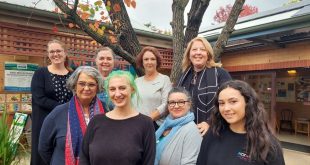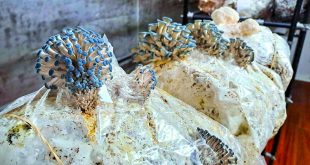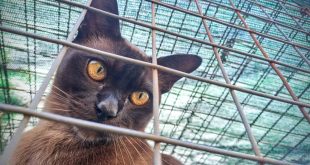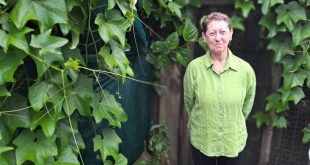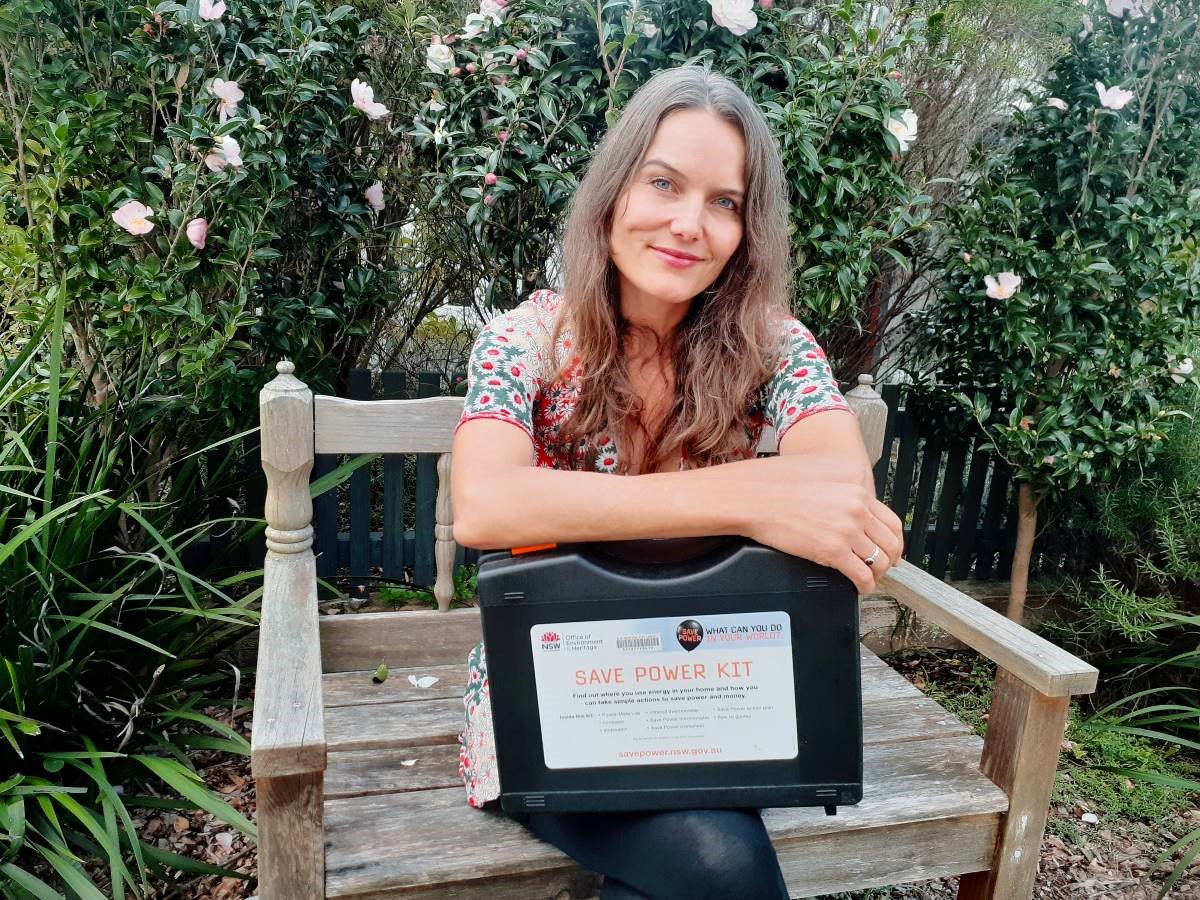
Belle Butler with a ‘My Energy and Water Saver’ kit borrowed from the library. (Photo by Nahla)
Story and photos by Belle Butler
Blue Mountains libraries now stock free-to-borrow ‘My Energy and Water Saver’ kits that Blue Mountains residents can use to assess their homes for energy and water efficiency. Belle Butler borrowed one of the kits and discovered some room for improvement in her Lawson home.
Key Points:
- Most per capita greenhouse gas emissions come from the electricity and heating needs of homes.
- The Climate Council touts energy-efficiency as one of the easiest, cheapest and fastest ways to reduce emissions.
- Borrowing a kit from a Blue Mountains Library can help you maximise your energy efficiency, cut your emissions and save on your energy bill.
Climate change is an issue so big that sometimes, as one little person on the planet, it’s hard to know what to do. And when everyday life is filled to the brim with various expectations and commitments, ‘doing’ something at all can feel like a daunting task.
However, even some small changes to your everyday habits can make a difference. Unless you are running your household on renewable energy (if you are, then kudos!), much of your greenhouse gas input will come from the electricity and heating needs of your home.
Here in Australia, most of our electricity still comes from non-renewable, polluting sources, with NSW still relying heavily on coal.
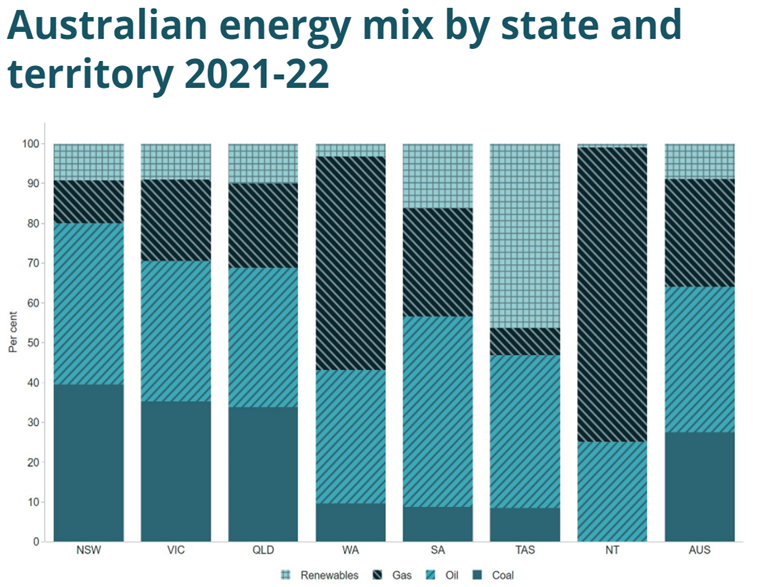
Graph of energy sources by state and territory. -from Australian Government – Department of Climate Change, Energy, the Environment and Water
Using this fuel for most of our energy needs makes us a hefty contributor to greenhouse gas emissions via these sources:
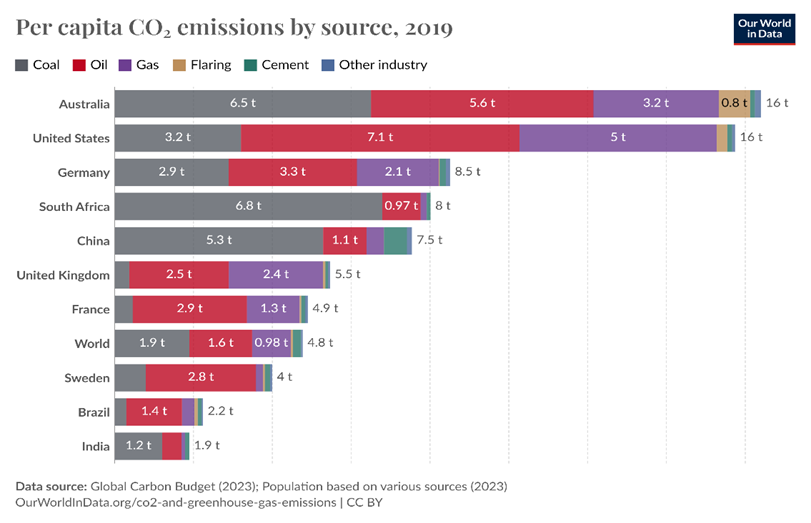
Graph by Our World in Data
This is a significant factor in our exceedingly large global contribution (per capita) to overall greenhouse gas emissions:
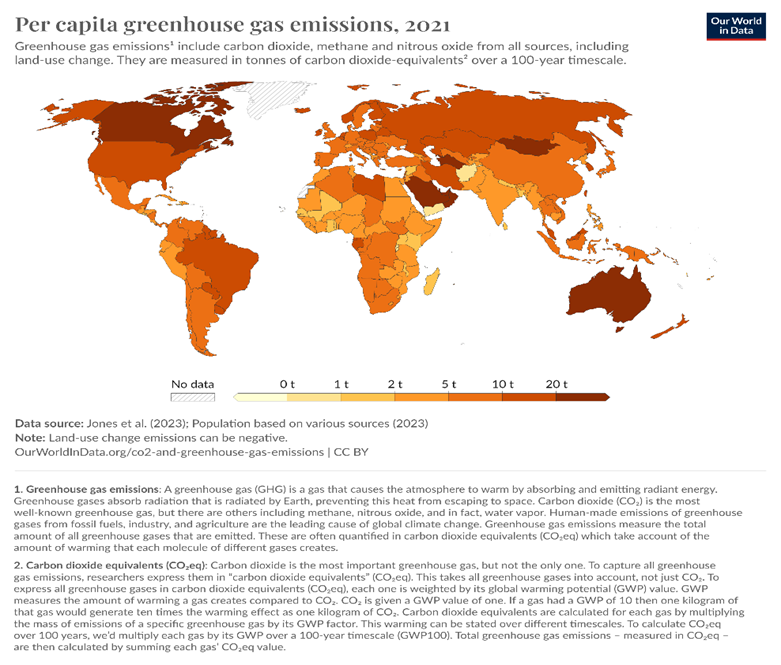
Graph by Our World in Data
These graphs present a compelling argument for renewables, but if investing in household solar isn’t an option for you right now, making changes to how you use energy can reduce your emissions (and your electricity bill). The Climate Council touts energy-efficiency as one of the easiest, cheapest and fastest ways to reduce emissions.
Test your energy efficiency
Blue Mountains City Council has now introduced ‘My Energy and Water Saver’ kits to its branch libraries, which residents can borrow free of charge. The kits contain tools and a guide on how to use them in order to identify where household reductions in power and water usage might easily be made. The kits come with the following items:
- Power Mate Lite – measures the amount of power drawn by an electrical appliance.
- Infrared Thermometer – Measures temperature of objects to find where heat is lost or gained. Great for testing windows and doors for draughts.
- Thermometer – measures air temperature including in the fridge and freezer.
- Compass – Identifies north and west facing rooms that receive the most sun.
- Stopwatch – Used to measure flow rates of showerheads and taps.
- Worksheets – Guides the user through helpful tests and allows for record-keeping of findings.
NB. The new version of the kit also includes a Thermal Imaging Camera (FLIR) which can measure radiant heat to help you prepare for future heat waves. It can also detect areas of energy loss in the home such as missing insulation, gaps in floorboards or around doors etc.
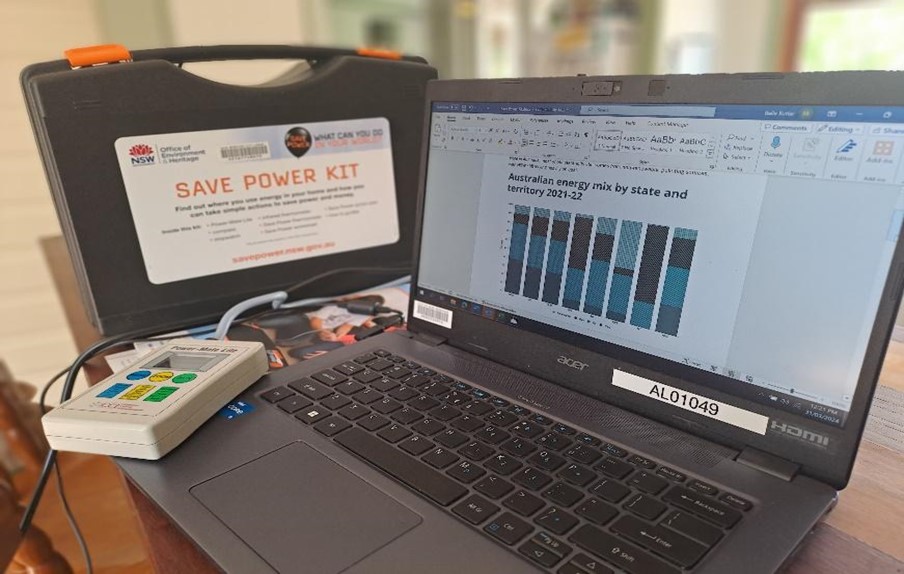
Testing out the energy consumption of my laptop while writing this article.
“Rising energy costs are a real concern for Blue Mountains residents,” said Mayor Mark Greenhill. “This kit is a simple and effective way to identify where heating or cooling might be escaping your home and make the necessary changes.
“Making your home more energy efficient is a key part of living sustainably and having an environmentally friendly lifestyle and this kit makes that process easy.”
Putting the Kit to Use
I live with my family in a draughty older Mountains home in need of some roof-work before solar panels can be installed. So we are classic candidates for this kit. Borrowing it from the library gave us an opportunity to talk to the kids about energy and water usage and then put our home to the test with some fun activities.
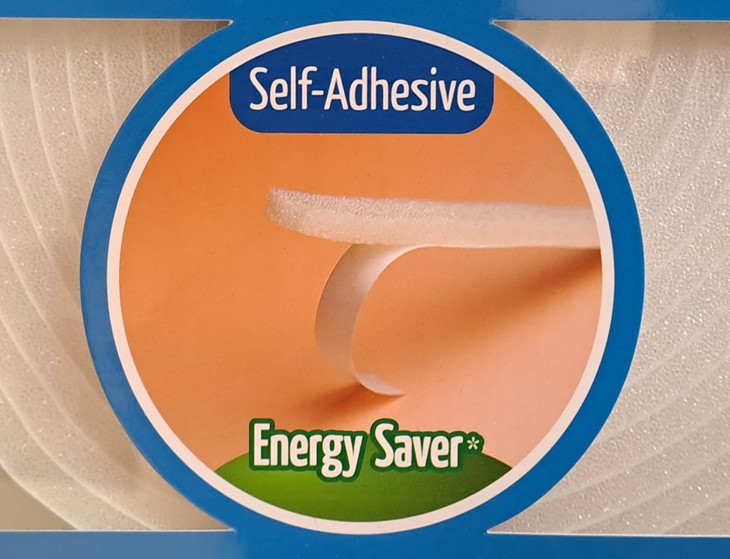
Draught tape can be purchased at hardware stores and easily applied around windows and doors to save on heating and cooling needs.
While we are probably considered more of a low-tech household, we still have the modern standards of a television and computers, and we found that we could make better choices by not leaving these devices on standby mode.
Our modest TV on standby amounts to about 50 kwh per year. Based on the emissions calculator on coolaustralia.org, that amounts to 43.5 kg Co2e (carbon dioxide equivalent, used to measure greenhouse gas emissions) each year. That seemed like a lot to me for an appliance that was just sleeping, and I wondered how many kilos of Co2e all the TVs on standby in the Blue Mountains are responsible for.
So I did a rough estimation based on the readings from my (comparatively small) TV applied to the number of dwellings in the Blue Mountains area according to the 2021 Census. If all 35,139 dwellings left one modest TV on standby for the entire year, and these households relied on the grid for their energy, these TVs would be responsible for 1,528,546.5 kg Co2e each year.
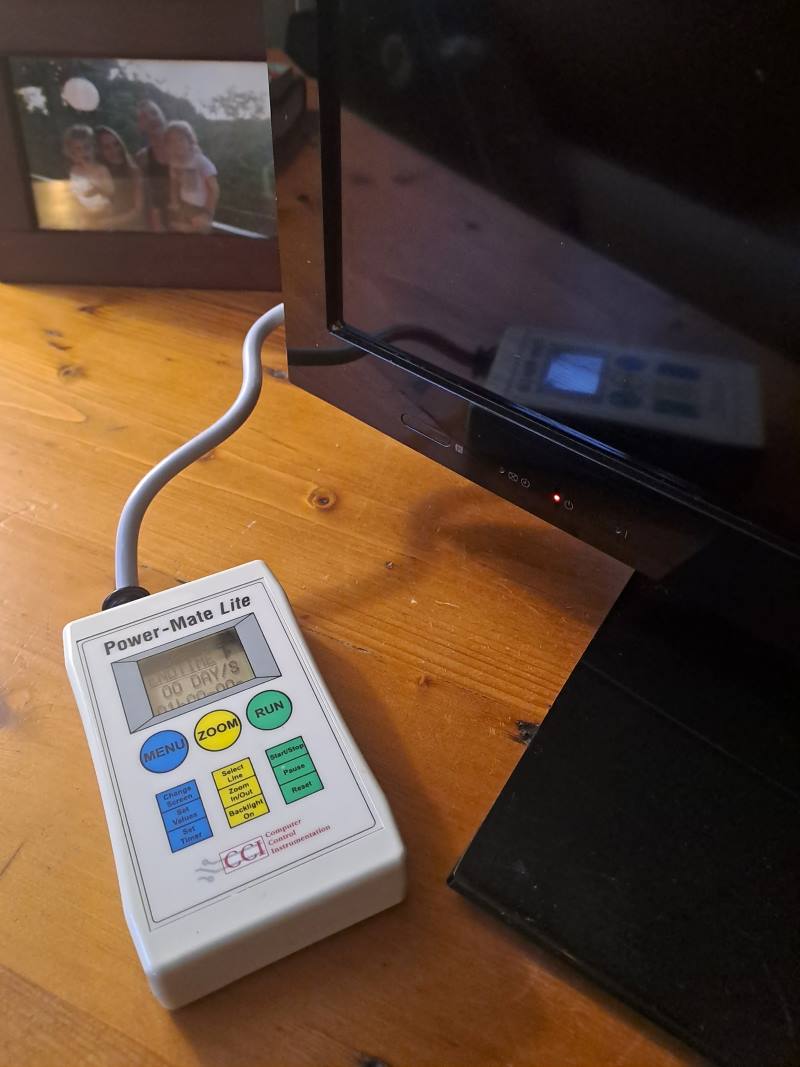
Testing the energy used by Belle’s TV while on standby
Obviously these are not official numbers. There are many variables not considered here, from size of TV and number of TVs per household, to whether households are turning off their TVs at the switch or running them partially or fully on solar energy. However, as a rough estimation, that’s a lot of pollution coming from sleeping screens in the Blue Mountains.
In another experiment, my son was able to measure how much energy is wasted when he forgets to turn off his bedside lamp for the day, after turning it on to read when he wakes up in the morning. Rough estimations on how often he does this resulted in about 1kg of Co2e emitted by a forgotten lamp each year.
We also measured the flow rate of our showerhead (below the maximum recommendation of 9 litres a minute), the temperatures of our fridge and freezer (just right), and the temperature difference between our west facing kitchen and our internal living room at 3pm on a warm autumn day: 33 degrees versus a pleasant 25 degrees. Time for double-glazing!
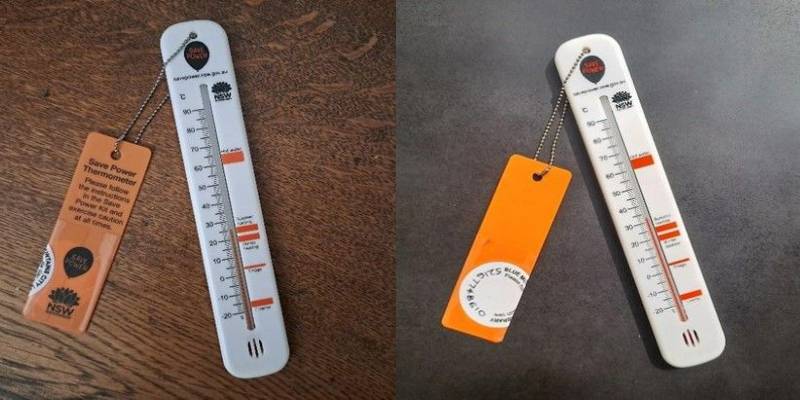
Thermometer reveals a nearly 10 degree difference between a western-facing room and an internal room on an Autumn day.
My daughter’s favourite activity was finding draughts in our windows (as well as testing her own temperature and mine) with the infrared thermometer. Although many of these windows already had draught tape, the thermometer revealed that most of the tape had worn through and needs replacing.
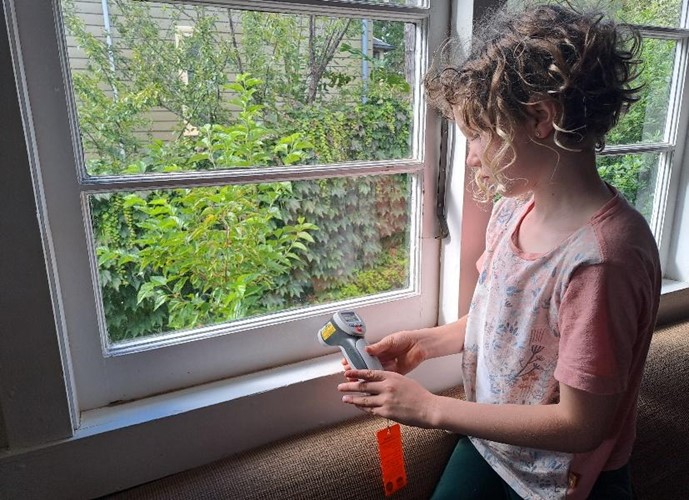
Nahla watching the temperature jump around on the infrared thermometer due to a window draught (on a day with very little wind).
Borrowing the ‘My Energy and Water Saver’ kit was a practical way of reassessing our electricity and water consumption habits, and it made the responsibility of household emissions more real and easily grasped for both the kids and the adults of our little abode.
Needless to say, the TV is no longer on standby and when my son forgets to turn off his bedside lamp, my daughter is quick to pull him up on it (“Leo, you left your lamp on, AGAIN!”).
If you’d like to understand your energy and water habits more comprehensively and make changes to reduce your emissions, I highly recommend borrowing this kit. You can also give feedback about your experience and tips for improvement at yoursay.bmcc.nsw.gov.au/my-energy-and-water-saver-kit.
Take Action:
- Borrow a ‘My Energy and Water Saver’ kit from your local Blue Mountains library.
- Use the tools to assess your home for energy and water efficiency and make changes like turning devices off at the switch, applying draught tape to your windows and changing your shower head for an improved flow rate.
- Get more tips for improving your energy efficiency at https://www.climatecouncil.org.au/top-tips-improve-home-energy-efficiency/
- Share this article with friends and family to help them save energy, water and money.
Share this article:
This story has been produced as part of a Bioregional Collaboration for Planetary Health and is supported by the Disaster Risk Reduction Fund (DRRF). The DRRF is jointly funded by the Australian and New South Wales governments.
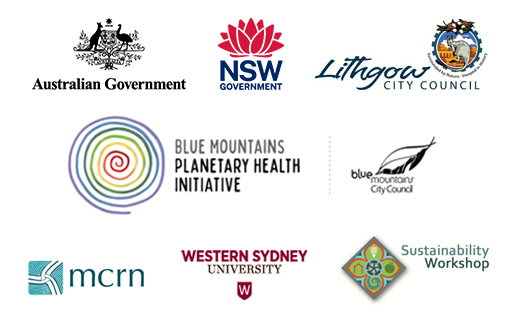
More from around the region
In April 2021 Blue Mountains City Council became the first Council and government entity in Australia to commit to integrating Rights of Nature (RON) principles into its operations and practices. Yesterday we were thrilled to be able to spend a few hours with Susie Talbot, an Australian lawyer, based in the UK, who was visiting on a Churchill Fellowship to explore the implementation of Rights of Nature in different parts of the world. It was inspiring to hear how she has spent decades using the law to achieve transformative change in relation to complex socio-economic and environmental challenges. In 2020, she founded the Anima Mundi Law Initiative to strengthen the intersections between human rights and ecology, and to encourage the practice of law in alignment with planetary realities and collective consciousness. Projects include the creation of a ‘Rights of Nature Toolkit’ and we look forward to working with her into the future. You can read more at her website: https://www.animamundilaw.org/
Photo: Susie Talbot standing in front of Scott Marr`s artwork in the Planetary Health Exhibition space.
#rightsofnature #earthjurisprudence #anewlegalstoryforanecologicalage #ecologicalage #churchillfellowship @churchillfellowship #animamundi #humanrights #ecology #planetaryhealth
Nelson Mandela once said “Education is the most powerful weapon which you can use to change the world”; and William Butler Yeats, the great poet, said “Education is not the filling of a pail but the lighting of a fire.” If you’re a teacher, educator or involved in education in some way in the Blue Mountains the staff of the Blue Mountains Planetary Health Initiative would love to meet you next Monday 20th May when we join the Blue Mountains Sustainable Schools Network to see how we can all join forces to urgently accelerate the change we need to restore the health of our planet. 3.30-5.30 at Faulconbridge Public School. RSVP Beth Healy DirtMum (details in poster)
#sustainableschoolsnetwork #collaboration #planetaryhealth #environmentaleducators #artteachers #englishteachers #musicteachers #allteachers
Hans and Tillie Coster have brought a Tolkien fantasy to life, building an underground Hobbit Hall at their property ‘Middle Earth’ in the Kanimbla Valley. They`ve come very close to self-sufficiency, storing their solar power in banks of nickel-iron batteries, and building underground has meant they`re more able to withstand extreme weather events. They`ve also reforested degraded country, planting over 3000 trees! Read more in Lithgow Area Local News (link in profile):
https://lithgowlocalnews.com/middle-earth-kanimbla-valley/
#middleearth #hobbiton #hobbithall #kanimblavalley #selfsufficient #offgrid #nickeliron #solarbatteries #nickelironbatteries #reforestation #undergroundhouse #compostingtoilet #disasterriskreduction #planetaryhealth
There are only about 750 Dwarf Mountain Pine plants left in the wild, according to the latest survey. The survivors are limited to waterfall spray and seepage zones in the southern escarpment between Katoomba and Wentworth Falls, but renewed efforts to save it in light of its potential upgrade to ‘critically endangered’ status are giving greater recognition to a rare and unusual prehistoric native in our midst. Read more in Katoomba Area Local News (link in profile)
https://www.katoombalocalnews.com/saving-the-dwarf-mountain-pine/
#dwarfmountainpine #criticallyendangeredspecies #prehistoricnative #biodiversity #collaboration #whatwecando #katoomba #wentworthfalls #bluemountains #planetaryhealth
Our Planetary Health newsletter is now out, sharing inspiring stories from the Lower Mountains to Lithgow: Read it here and subscribe via any of the Local News sites: https://bit.ly/3QKevs6 (link in profile)
Katoomba Area Local News: Living on the Ledge: Saving the Dwarf Mountain Pine
Lithgow Local News: How a Tolkien Fantasy Turned Into Off-grid Reality at Middle-Earth in the Kanimbla Valley
Blackheath Area Local News: Inspirational, Intergenerational Play in Blackheath
Lower Mountains Local News: The Positive Social Impact of the Glenbrook Country Women’s Association
Mid Mountains Local News: Stronger Together: Mid Mountains Neighbourhood Centre Walks the Talk
Springwood Area Local News: People Of Binfluence: The 2024 Binfluencer Awards
#solutionsmedia #hyperlocalnews #planetaryhealth #localstories #inspiration #bluemountains #lithgow
Woohoo we just hit 1 MILLION views on our reel about Physicist Hans Coster and why he`s using nickel-iron batteries.
You can now read the full story and watch a video about him and his wife Tillie at their property Middle Earth (links in profile). We`d love you to subscribe to our Blue Mountains Planetary Health YouTube channel and share the latest video on him there as well.
The video is fabulous:
https://www.youtube.com/watch?v=3kqAczIRzqk&t=17s
#offgrid #underground #nickelironbatteries #planetaryhealth #reforestation #selfsufficient #middleearth #bagshotrow
A small group of Blue Mountains women is helping local women survive and thrive and also contributing to improve maternal and newborn survival in developing countries. Assembling birthing kits for women in remote locations is just one of the many ways the @zontaclubbluemountains is empowering and supporting women, both abroad and at home. Read more in Lower Mountains Local News (link in profile)
https://lowermtnslocalnews.com/zonta-blue-mountains/
#womensupportingwomen #maternalhealth #birthingkits #zontainternational #zonta #abetterworldforwomen #localaction #localactionglobalimpact #planetaryhealth
We are thrilled to announce that award-winning health writer and author Sophie Cousins will be leading the workshop: Our Community, Our Stories: Writing for Change from 2-5pm on Saturday 25 May at the Planetary Health Precinct. Sophie`s work has been published in the New York Times, London Review of Books, the Guardian, the Lancet, Meanjin and others. She also works as a public health consultant for the World Health Organisation. The workshop will be followed at 7pm by the launch of the Planetary Health Writers Network. Places are limited so bookings essential (link in profile): https://www.eventbrite.com.au/e/our-community-our-stories-writing-for-change-tickets-895548458547
#writingforchange #impactfulstories #solutionsjournalism #writingworkshop #planetaryhealth #changethestory #thenewsweneed #writersnetwork #bluemountains #katoomba
We`re thrilled to welcome Tamsyn McGrouther to our growing team of volunteer storytellers. She`s reporting on how the Springwood Lot Party transformed an underused space, the car park at Springwood Train Station, into a vibrant community space with food stalls, art opportunities and live music. Read more in Springwood Area Local News (link in profile) : https://springwoodlocalnews.com/springwood-lot-party-2024/
#changethestory #hyperlocalmedia #solutionsmedia #springwood #inspiringstories #planetaryhealth #bluemountains #localnewsmatters
What do tea, samurai clans, William McArthur, Benjamin Franklin, Vietnam and the Botanic Gardens at Mount Tomah have in common? Read our story in Blackheath Area Local News to explore the way camellias and cultures are woven together and why it’s important we think about conserving biodiversity as a global project implemented at a local level. (link in profile) https://blackheathnews.com/camellias-at-blue-mountains-botanical-garden/
@botanicsydney #botanicgardens #mountomahbotanicgardens #camellias #camelliasinensis #tea #samurai #bluemountains #themounts #biodiversity #planetaryhealth
Mushrooms are a hot topic at the moment with more and more research illuminating the essential role these organisms play in the health of the planet as well as the significant health and medicinal benefits they hold for humans. Belle Butler visited local mushroom grower, Alex Felix, at his farm in Lawson to talk about the mighty mushroom. Read more in Mid Mountains Local News (link in profile)
https://www.midmtnslocalnews.com/earthrising-mushroom-farm/
#mushroomgrowkit #mushrooms #fungi #growyourown #lawson #bluemountains
Mushrooms are a hot topic at the moment with more and more research illuminating the essential role these organisms play in the health of the planet as well as the significant health and medicinal benefits they hold for humans. Belle Butler visited local mushroom grower, Alex Felix, at his farm in Lawson to talk about the mighty mushroom. Read more in Mid Mountains Local News (link in profile):
https://www.midmtnslocalnews.com/earthrising-mushroom-farm/
#lawson #mushroomfarming #fungi #mushroomcompost #oystermushrooms #mushroomgrowkit #bluemountains


